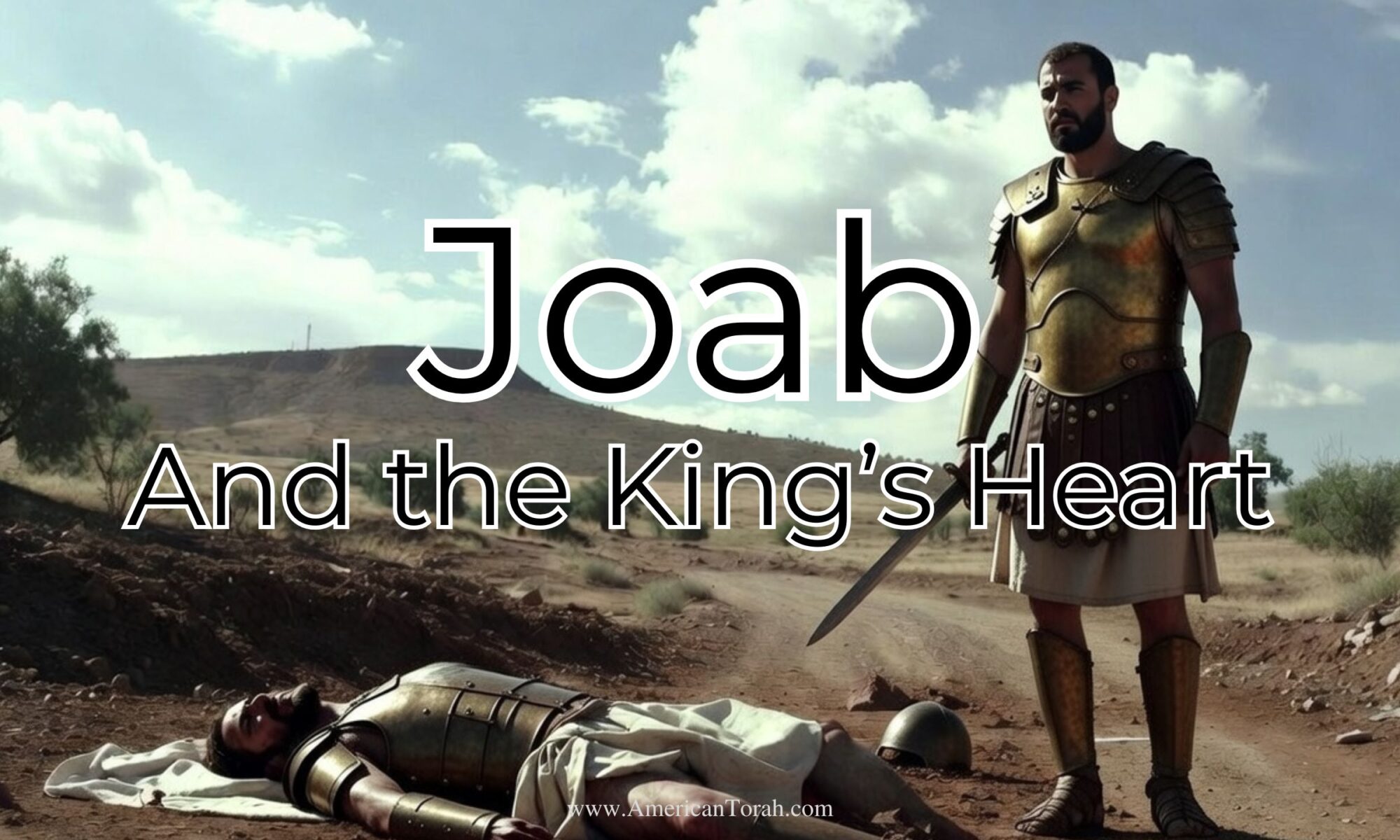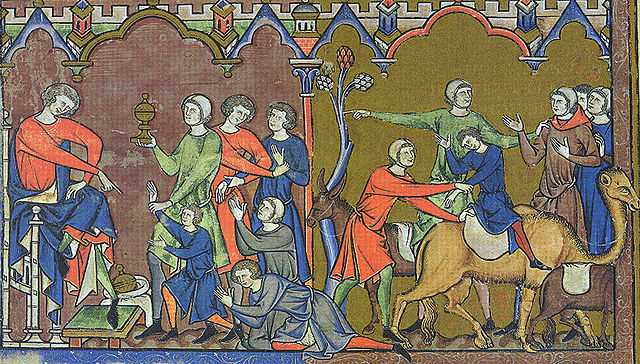Joab stands out in Scripture as a man among men. He was King David’s nephew and one of his inner circle when David was little more than an outlaw hiding in the caves of Judea. Joab stuck with David through the years of running from Saul, triumph after Saul’s death, and even when the rest of the Kingdom turned away. He was a fierce warrior and one of the greatest generals of ancient Israel. Even when David demoted him, his loyalty never wavered.
Yet David’s death bed instruction to Solomon was “do not let his gray head go down to Sheol in peace.” (1 Kings 2:6) In other words, “Kill him.”
How does a man who fought so loyally for David all his life end up on the king’s short list of unfinished business?
The Loyal General
Joab was the son of David’s sister Zeruiah. Blood ties run deep, but Joab’s promotion didn’t come through nepotism. He earned his place with decisive action at the battle for Jerusalem (1 Chronicles 11:6) and continued to prove his worth on battle after battle.
Consider these highlights of his military career:
- He crushed the rebellion of Ish-bosheth, Saul’s surviving son who had claimed the throne over the northern tribes, securing David’s rule over all Israel.
- He led campaigns against the Philistines, Ammonites, Edomites, and Syrians, expanding David’s kingdom almost to the full extent of God’s promises to the patriarchs
- When Absalom rebelled and drove David from Jerusalem, Joab stayed with his king, commanded the loyal forces, and delivered the decisive blow that ended the uprising.
Yet there are hints of a serious problem even in the midst of these great victories.
When David heard the news of Absalom’s death, his sorrow was so great that the victorious army crept back into the city as if they had fled the battle like cowards. Joab took David’s reaction as a betrayal of those who had risked and even given their lives for the kingdom, and who could blame him? He marched into the palace and rebuked the king in front of everyone: “Today, you shamed all of your servants and your household because you love those who hate you and hate those who love you!” (2 Samuel 19:1-7)
Joab warned David that he needed to change his tune and congratulate the troops or he would face a worse rebellion than the last. David heeded Joab’s advice, but he also took the opportunity to extend an olive branch to some of the ringleaders of the rebellion, including inviting Absalom’s defeated general Amasa to replace Joab at the head of the king’s army. Joab must have felt this to be almost as great a betrayal as David’s apparent lack of sympathy for the men of his army.
When Sheba, a Benjaminite, led another rebellion in 2 Samuel 20, David’s new general Amasa proved himself to be either incompetent or treasonous; it’s difficult to tell which. He delayed assembling the army and then dragged his feet in putting down the rebellion. Joab saw what was happening and assassinated Amasa without consulting David, took command of the army, and promptly put down Sheba’s rebellion, this time with an admirable lack of bloodshed.
Joab returned to Jerusalem and probably could have taken the throne for himself if he wanted, but he didn’t have those kinds of ambitions. Joab just wanted to serve his king in the way he thought best.
This created a very awkward situation for David. It seems to me that the best course would have been some kind of severe disciplinary action, followed by a restoration to service at a lower rank, maybe as the commander of a frontier outpost or of an expeditionary force. David didn’t consult me, however. He accepted Joab back in his old place as top general, apparently without confrontation or objection.
Joab was loyal and certainly a fearless and competent soldier on the surface, but something was terribly wrong in the man and in his relationship with his king.
Joab’s Failures
A closer look at Joab’s achievements tarnishes a bit of his shine.
- Murder of Abner – During the transition from Saul’s house, Abner came to David in peace to surrender the northern tribes. Joab, angry that Abner had killed his brother Asahel at the battle of Gibeon (2 Samuel 2:12-32), lured Abner outside the city gate and stabbed him to death (2 Samuel 3:27). David publicly mourned and cursed Joab’s house for the treachery (v. 29–39), but he didn’t punish him directly.
- Killing of Absalom – David gave explicit orders to capture his son Absalom, but to spare his life (2 Samuel 18:5). Joab ignored the command, drove three(!) javelins into Absalom’s heart while he was stuck in a tree, let his personal armor-bearers maul him, and then threw his body in a pit.
- Rebuke of David – He rebuked the king publicly for mourning the death of Absalom. This could have been done privately.
- Assassination of Amasa – Joab killed Amasa in cold blood. There was need for quick, decisive action, but he doesn’t appear to have alerted David to the problem nor to what he intended to do. He certainly disregarded David’s clear instructions
- Uriah and Bathsheba – When David ordered Joab to put Uriah in the front line and withdraw so he would be killed, Joab carried out the order without overt protest, but sent word back to David in a way that subtly but publicly shamed him for causing the deaths of numerous soldiers besides Uriah for his own selfish gain (2 Samuel 11:14–27).
- The census – When David ordered a census of Israel’s fighting strength, Joab immediately saw the sin and protested: “Why does my lord the king desire this thing? Why should he bring guilt on Israel?” He knew that such a census was contrary to God’s instructions and could cause Israel great harm, but he carried it out anyway (1 Chronicles 21:1-7).
- Adonijah’s Rebellion – Finally, at the end of David’s life, when his son Adonijah tried to seize the throne when everyone knew that David had chosen Solomon as his heir, Joab put his substantial support behind the usurper. The man who had spent decades protecting David’s crown now backed the wrong son.
David’s Tolerance
Why did David tolerate Joab’s disrespect for so long? The man was undeniably effective. He won battles David couldn’t afford to lose. He kept the army together when everything else fell apart. Although it seems that Joab’s loyalty was more to the kingdom itself than to David, that loyalty and his military competence bought him decades of grace from the king.
But David’s tolerance wasn’t mere pragmatism. It was prophetic. Consider Yeshua’s kingdom parables.
The Parables of the Compromised Kingdom
The Kingdom of Heaven is like a field sown with wheat and tares. An enemy sowed tare seeds among the wheat, and the two grow together until they have both grown to maturity and can more easily be separated without damaging the wheat. (Matthew 13:24–30)
The Kingdom is also like a mustard seed that grows into a small tree that is invaded by birds. (Matthew 13:31-32)
The Kingdom is also like a prince’s wedding feast. When the nobility declined the king’s invitation, he invited the commoners. When the event was well underway, the king saw one man without the appropriate attire. Since the king would have provided such clothing to any guest who could not afford it, this man had either infiltrated the wedding without the king’s invitation or he had deliberately eschewed proper respect for his host. (Matthew 22:1-14)
These three parables paint a picture of a Kingdom of Heaven in which the truly righteous (wheat, mustard tree, and respectful guests) mingle inseparably with those who only appear righteous (tares, birds, and disrespectful guest) until a time of separation and judgment. The difference between the righteous and the wicked isn’t always in their location or their deeds, but in the heart. Eventually, the state of a person’s heart always comes out in deeds, but it often takes time, and sometimes only God (the King) can tell the difference.
The King allows the tares or the birds to remain while they serve a useful purpose or while their removal might be harmful to the righteous, but their removal is guaranteed because they neither understand nor align with the heart of the King.
Joab’s Judgment
Joab was loyal and competent, but he never truly understood David’s heart.
He killed when the king said to spare. He resented the king mourning for his own son. He failed to hold the king to his own standards of righteousness. He supported a usurper over the king’s choice of heir.
Joab was like Judas–a close friend, ally, treasurer, and even a miracle-worker in the name of Yeshua–yet ultimately a betrayer. I don’t think Judas acted out of malice. He acted to force Yeshua into the role that he wanted, rather than letting Yeshua set the Kingdom’s agenda and strategy. He never really knew his master’s heart, and ended up serving that heart’s purposes anyway to his own destruction.
David’s final charge to Solomon mirrors the final judgment coming to everyone who claims to be God’s people but never truly submits. Despite all of their apparent victories and years of service, when they stand before the Bema Seat after the resurrection, Yeshua will say, “I never knew you. Depart from me, you who practice lawlessness.” (Matthew 7:23)
Joab is like religious Jews who keep a form of the Law but reject Yeshua as Messiah and like devout Christians who proclaim faith in him but refuse to obey his instructions. They do many great works, they look the part, but their heart is far from him. (Matthew 15:8) We can be the most useful soldiers in the kingdom–leading Bible studies, feeding the poor, defending sound doctrine–and still be strangers to the King’s heart.
Here’s the question you need to ask yourself: Are you Joab? Are you dutiful, victorious, and useful on the outside, but inwardly estranged from what moves Yeshua most: mercy, humility, obedience from love rather than pragmatism?
There’s still time to repent and begin the process of remaking your heart in his image. YHWH is gracious to those who seek His face in truth. The first step is to humble yourself and admit, “I don’t know what’s best. May your will be done through me, Lord, and not mine.”





